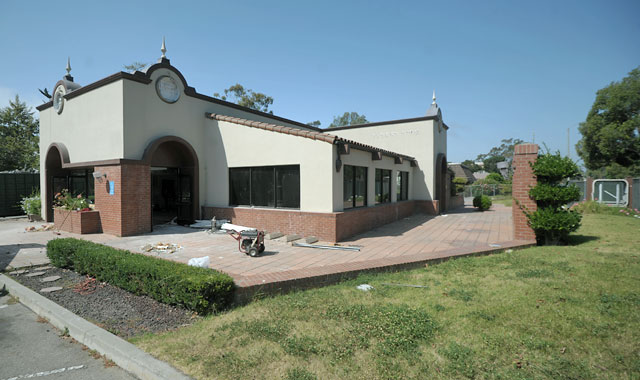Playing Chicken at Burgergate
Fast-Food Site Jinxed?

Jinxed Joint? They dubbed it “Burgergate” back when Burger King’s upper State Street drive-in got okayed under highly dubious circumstances.
Now, people like community gadfly Lee Moldaver observe, the site of the 1970s controversy has reemerged in the wake of a national fuss. Chick-fil-A, a Southern fast-food chain, is moving in at 3707 State Street, bringing a broiler-hot dispute over gay marriage to Santa Barbara.
“Maybe that building is jinxed,” cracked Dave Davis, former city planning director, now executive director of the Community Environmental Council. “One of the most haunted locations in town,” says Moldaver.

So we’re swapping grilled cow corpses for chicken sandwiches promoted by the suddenly infamous owner of the chain, Dan Cathy. Not only has he been speaking out against same-sex marriage but Chick-fil-A profits go to anti-gay hate groups, according to the Southern Poverty Law Center.
The pseudo-Spanish-style eatery wouldn’t even be a drive-in except for some questionable maneuvers by a couple of city officials in the 1970s. Upper State was a mess, Davis recalled. Northside residents had long complained that projects that would never be approved downtown were dumped there. Traffic was a nightmare. Zoning was a jigsaw puzzle where nothing seemed to fit. Pollution was a mounting problem.
Finally, at a tumultuous community meeting at Adams School, people “were yelling at the City Council,” Moldaver recalled. As a result, shaken councilmembers formed a task force, then applied a strict development overlay onto Upper State. The size and intensity of new projects were restricted, parking was put under controls, left-turn lanes were established to ease traffic problems, and polluting drive-throughs were banned.
But Burger King had a problem. It wasn’t quite all the way through the approval process. But it had clout. The woman who owned the franchise was the daughter of a Burger King senior exec and the ex-wife of a well-connected GOP VIP, Moldaver said.
Voilà! When the fast-food joint began to take shape, lo and behold, there was the drive-through window. Northside folks had a fit. Turns out that at the 11th hour, just before the moratorium took effect, a guy named Oliver Ziebarth stepped into the picture. The city’s former building-permit honcho, by then a Planning Commission member, was secretly deputized by planning director Chuck Dryer to do the project’s final plan check, Davis said. Before the clock struck midnight, actually or figuratively, Dryer okayed the plans — with the drive-through window.
A scandal erupted, but nothing could be done. It was all legal-like, although highly suspicious. Just who was behind it, we’ll probably never know. As far as I know, Ziebarth never spilled the beans before he died, which was within a year. Dryer is also dead.
Now we await the next chapter at 3707 State. Will there be protests over Dan Cathy’s anti-gay marriage stand, or will people just vote with their feet and stay away?
Old is Good (Sometimes): One of the many regrets of my life is that I didn’t buy a woodie when they were affordable. But I can dream, and did I ever last weekend, wandering among the cars perched up on the lawn at City College at the 12th Annual Woodies at the Beach show. Ran into Craig Fraki, who organizes gatherings of vintage-trailer owners, fun open houses featuring these bright relics. Usually with displays of Melmac dishware and other memorabilia from a bygone era. Classics and new babies can be seen on Coast Village Road Sundays, around 8-10 a.m., thanks to the Cars & Coffee folks. Surprises every week. And to gaze at sleek European classics, visit the Mullin Automotive Museum in (yes) Oxnard. Tel. 385-5400.
Costly Oak: Pamela Lange didn’t dream that after she cut down a problem California live oak on her Foothill Road property near Carpinteria, the county would slap her with a coastal-zone violation and a $2,272 bill. See, because it was an oak, she needed a permit. No other tree species is mentioned in the law.
Someone, it seems, turned her in, and because the deed had already been done, the normal fee was doubled. Lange had to hire an arborist, who found that the tree had been damaged by a large split, so he considered the removal understandable. Because Lange is not a scofflaw and is doing her best to deal with what she feels is an excessive and “ridiculous” bill, why doesn’t the county split the difference, lop off the doubled fee, and do the right thing?



